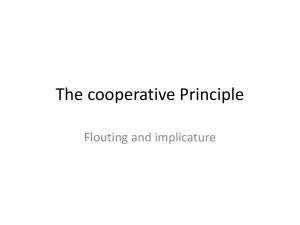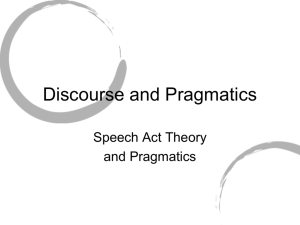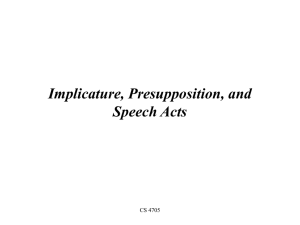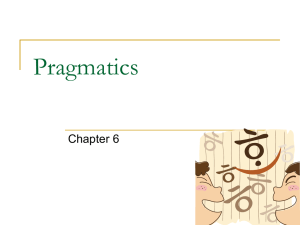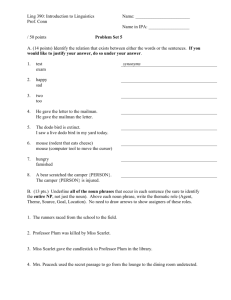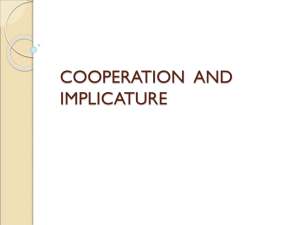Review of Speech Act Theory Implicature Force PRAGMATICS
advertisement
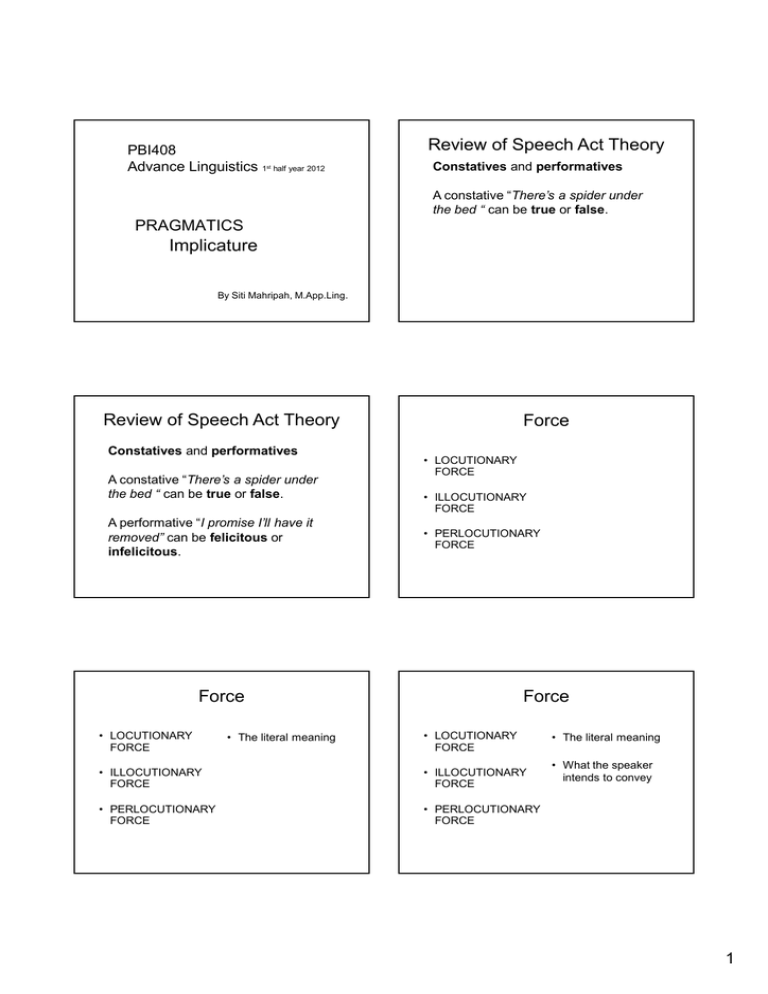
PBI408 Advance Linguistics 1 st Review of Speech Act Theory half year 2012 PRAGMATICS Constatives and performatives A constative “There’s a spider under the bed “ can be true or false. Implicature By Siti Mahripah, M.App.Ling. Review of Speech Act Theory Constatives and performatives A constative “There’s a spider under the bed “ can be true or false. A performative “I promise I’ll have it removed” can be felicitous or infelicitous. Force • LOCUTIONARY FORCE • ILLOCUTIONARY FORCE • PERLOCUTIONARY FORCE Force • LOCUTIONARY FORCE • The literal meaning Force • LOCUTIONARY FORCE • ILLOCUTIONARY FORCE • ILLOCUTIONARY FORCE • PERLOCUTIONARY FORCE • PERLOCUTIONARY FORCE • The literal meaning • What the speaker intends to convey 1 Force “I’ll have it removed”. • LOCUTIONARY FORCE • The literal meaning • The literal meaning • ILLOCUTIONARY FORCE • What the speaker intends to convey • What the speaker intends to convey • The effect of the speaker’s words • The effect of the speaker’s words • PERLOCUTIONARY FORCE “I’ll have it removed”. “I’ll have it removed”. • The literal meaning a statement about a future action • The literal meaning a statement about a future action • What the speaker intends to convey • What the speaker intends to convey a promise • The effect of the speaker’s words • The effect of the speaker’s words “I’ll have it removed”. Indirect speech acts can be identified because… • The literal meaning a statement about a future action • The felicity conditions for the literal meaning are not met. • What the speaker intends to convey a promise • There exists another meaning for which the felicity conditions are met. • The effect of the speaker’s words the hearer expects the action to take place. • This other meaning makes sense in context. 2 Indirect speech acts can be identified because… Indirect speech acts can be identified because… • The felicity conditions for the literal meaning are not met. • The felicity conditions for the literal meaning are not met. • There exists another meaning for which the felicity conditions are met. • There exists another meaning for which the felicity conditions are met. • This other meaning makes sense in context. • This other meaning makes sense in context. Choice of an indirect speech act Limitations of SAT Too simplistic! Politeness Reducing the threat of loss of face to speaker, hearer or both. e.g. I don’t suppose you’d like to go out with me would you? – We can’t describe all utterances in terms of force. – SAT can’t capture all layers of meaning. – SAT can’t deal with irony or irrelevance – What is not said is also important IMPLICATURE In this session we will consider… • Conventional and generalised implicature • Conversational implicature • Paul Grice 1913-1988 – The co-operative principle Gricean maxims – Non-observance and what it means – Context and culture – Learning of inferencing skills – Some problems with the CP 3 IMPLICATURE Grice identified 2 types • Conventional • Conversational Conventional implicature What conventional shared beliefs do the following assume? • Of poor but honest parent, he was born….. • “You reverse park well, for a woman.” (personal communication from a sexist acquaintance!) These contain implicatures which are not directly stated, but revealed by the choice of “but” and “for”: More examples of conventional implicature • He is nasty but attractive. • He cooks well, for a man. People who are poor are not (usually) honest. Women are not usually good at reverse parking (!!!) • He is a scoundrel and yet I like him. • Even John likes him • You’ve eaten the chocolates again The implicature is made by the choice of words but, for, yet, even, Again, More examples of conventional implicature • But He is nasty but attractive. (implies this is a contrast – nasty people are not usually attractive) • For He cooks well, for a man. (implies a prejudice against men’s ability to cook) • Yet He is a scoundrel and yet I like him. (a contrast with expectation) • Even Even John likes him (implies that it is unusual for John to like somebody or surprising that John should like this person, or that a large number of people like him which is to be expected but the fact that John likes him is not. ) • Again You’ve eaten the chocolates again – there was a previous instance where you also did this. • Conventional implicature can be understood without prior background knowledge • The assumptions can be derived from the utterances themselves. E.g.: Even Chris was quiet today We can understand that Chris is not usually quiet even if we don’t know who he/she is. 4 (Broader) Generalised implicature embodies cultural assumptions • e.g. If women are described as having a good personality, then this suggests they are not attractive. however – context plays a role in whether generalised implicatures apply in particular cases. • Jess: • Harry: • • • • • If she’s so great, why aren’t you taking her out? How many times do I have to tell you , we’re just friends. Jess: So you’re saying she’s not that attractive Harry: No, I told you she IS attractive Jess: But you also said she has a good personality Harry: But she HAS got a good personality Jess: [stops walking throws hands up as it to say AHA!] CONVERSATIONAL IMPLICATURE “There are times when people say (or write) exactly what they mean, but generally they are not totally explicit. Since, on the other occasions they manage to convey far more than their words mean, or something quite different from the meanings of their words, how on earth do we know, on a given occasion what a speaker means?” (Thomas 1995: 56) Harry is trying to set up a blind date between his male friend Jess, and his female friend Sally. • Harry: What? • Jess: When someone’s not attractive, they’re always described as having a good personality. • Harry: Look – if you were to ask me what she looked like and I were to say “She’s got a good personality” that means she’s not attractive. But just because I happen to mention that she has a good personality, she could be either. She could be attractive with a good personality or not attractive with a good personality. • Jess: So which one is she? • Harry: Attractive • Jess: But not beautiful, right? Conversational implicature: the co-operative principle '...make your conversational contribution such as is required, at the stage at which it occurs, by the accepted purpose or direction of the talk exchange in which you are engaged..' (Grice, 1975:45) 5 Quality: Quantity: Try to make your contribution true; Give the right amount of information;. do not say what you believe to be false do not say that for which you lack adequate evidence Relation: make your contribution as informative as is required do not make your contribution more informative than is required Manner: Be perspicuous: (clear) Be relevant: Make your contribution consistent with the topic of the context and co-text avoid obscurity of expression avoid ambiguity be brief be orderly Not rules…observed / assumed principles. In responding to a question, speakers have a choice: • An attempt to explain how the hearer gets from what is said, (expressed meaning) to what is meant, (implied meaning). 1. Say exactly what you mean. Where are the chocolates? 6 In responding to a question, speakers have a choice: 1. Say exactly what you mean. They’re in the fridge. Where are the chocolates? Speakers have a choice: 2. Give less information than required. Where are the chocolates? Somewhere in the house. No implicature created Speakers have a choice: . What does she mean by that? 3. Give more information than required. Where are the chocolates? On the third shelf of the fridge 9.5 cm from the eastern wall, between the butter and the ginger jam. Speakers have a choice: . What does she mean by that? 4. Give information that does not seem to be relevant. Where are the chocolates? I’m just going out.. 7 Speakers have a choice: . What does she 5. Respond in a confusing way. Well, chocolate is like life – it flies, it melts, who can trim its wings and halt its flight…. Where are the chocolates? Inferring meaning • Hearers assume speakers will observe the co-operative principle. • Speakers do not always do this. mean? (She probably ate them! ) Non-observance may be: • overt or covert • intentional or unintentional Inferring meaning • If non-observance is overt, hearers assume there is a reason, and they look for it. Clash of maxims What is happening here? Where are the chocolates? You could ask John. IMPLICATURE 8 Ways of not observing the CP • Infringing Are you saying John ate them? Ways of not observing the CP • Infringing • Opting out Ways of not observing the CP • • • • Infringing Opting out Violating Flouting Ways of not observing the CP • Infringing • Opting out • Violating Ways of not observing the CP [see handout] • • • • • Infringing Opting out Violating Flouting Suspending 9 The CP, culture and discourse. What might be happening here? In real discourse: Choices about creating implicatures are made in situational, cultural and cotextual contexts. Where are the chocolates? I bought them last time TASK 1: Flouting of maxims Are you implying I should buy them more often? I never said that! Assuming the speaker is being co-operative, what maxims appear to be being flouted in these examples? • What implicature is being created? • A: What time does the next train leave? • B: Some time between now and lunchtime • A: What time does the next train leave? • B: It’s Sunday • A: This train is slower than a snail The CP, culture and discourse In real discourse: People are not always co-operative or benevolent. Customer: Does your dog bite? Hotel receptionist: No Customer : (holding out his hand to the dog) Nice Doggie! (Dog bites him) Customer : I thought you said your dog didn’t bite? 10 Customer : Does your dog bite? Hotel receptionist: No Customer : (holding out his hand to the dog) Nice Doggie! (Dog bites him) Customer : I thought you said your dog didn’t bite? Hotel receptionist: That is not my dog. TASK 2 1. Could you take Spot for a W-A-L-K? 2. Have you got any unborrowed books in your bag? 3. I love it when my assignments are all due in the same week! 4. It is a postgraduate course. 5. He’s a pig! 6. He’s got a nice car. 1. Could you take Spot for a W-A-LK? In this case the hearer would notice that the speaker has failed to follow the maxim of manner, be perspicuous, by spelling out the word instead of saying it. He would look for an explanation for this. In the context of the dog being present, it would be logical to infer that she would not want the word to be overheard and understood by the dog. • People breach and sometimes exploit maxims in a variety of ways. Consider the following examples (see handout) TASK 2 cont: 7. Food. 8. If I told you that I’m afraid I’d have to kill you. 9. I’ve got a duck. 10. I’ve only got a few more copies to do….. 11. I don’t know. 12. Prime minister…..etc… 2. Have you got any unborrowed books in your bag? This is a case of violating rather than flouting the maxim of quantity, make your contribution as informative as required, in that the student deliberately fails to provide some vital information, while appearing to answer the question fully. The difference between these cases is that while flouting is overt, intended to be noticed by the hearer, violating is not. The student does not actually tell a lie, but allows the librarian to draw the wrong conclusion. 11 3. I love it when my assignments are all due in the same week! This is a case of flouting the maxim of quality, do not say what you believe to be false, in that (unless the student has a very unusual attitude to assignments) what she has said is not true. The hearer, recognizing it as overtly false, is then pushed to seek an alternative related proposition, and will probably conclude that irony is being used and that the opposite is true. Irony: not just saying the opposite of what you mean? Mother – coming in to a child’s untidy room: “I love children who keep their rooms tidy!” On hearing a person shouting and swearing and breaking things: “ You can tell he’s upset” IRONY – joke told by British English speakers at the expense of US speakers. SAN FRANCISCO MAN BECOMES FIRST AMERICAN TO GRASP SIGNIFICANCE OF IRONY Jay Fullmer, 38, yesterday became the first American to get to grips with the concept of irony. "It was weird," Fullmer said. "I was in London and, like, talking to this guy and it was raining and he pulled a face and said, "Great weather, eh?" and I thought "Wait a minute, no way is it great weather." Fullmer then realised that the other man's 'mistake' was in fact deliberate. Fullmer, who is 39 next month and married with two children, aged 8 and 3, plans to use irony himself in future. "I'm, like, using it all the time," he said. "Last weekend I was grilling steaks and I burned them and I said "Hey, great weather!". 4. It is a postgraduate course. The speaker has said something which is obviously true and already known to the hearer, so in the first analysis neither are abiding by the maxim of quantity, make your contribution as informative as required. The lecturer would probably derive the implicature “There is too much reading for this subject (and perhaps I will be unable to do it)” The student would understand “this is what you should expect in a postgraduate course (and if you are unable to do it perhaps you shouldn’t be taking this course)”. However, expressing their opinions in this way has helped them to avoid open conflict. 5. He’s a pig! This is another example of a flouting of the maxim of quality, but this time by the use of a metaphor. Real pigs do not go out with young women, so Max cannot literally be a pig; therefore the deductive process might proceed as follows: • Max is a human and therefore cannot possibly be a pig. • There is no evidence that Kylie is trying to deceive me • There is no evidence that Kylie is herself deceived about this matter • Kylie must be trying to put across some alternative, related proposition • The most probable related proposition is that Max shares some characteristics with a pig, for example that he is dirty rude lazy greedy…. 12 6.He’s got a nice car. This is an example of a clash of the maxims of quality and quantity. Kylie does not wish to say something which is untrue, or to give her honest opinion in a direct manner. By “faint praise”, providing less information than is required, she flouts the maxim of quantity and encourages Suzie’s sister to search for an implicature. Compare with “ she’s got a nice personality” 8. If I told you that I’m afraid I’d have to kill you. In this case, James is opting out, overtly refusing to answer his girlfriend’s question. He is indicating his unwillingness to co-operate in the way that the maxim requires. No implicature is created here. 10. I’ve only got a few more copies to do….. 7. Food. Again, a flouting of the maxim of quantity, by providing less detail than required. Anne is compelled to search for an explanation and can derive the implicature that her husband means that he does not care what there is for dinner. It could be argued (although this is going beyond Grice) that there is some interpersonal information in his decision to phrase his response in such a cursory, even impolite way. 9. I’ve got a duck. This is a case of infringing a maxim. Because of interlanguage constraints, the learner (unable to distinguish between minimal pairs of phonemes like k/g) has produced an infringement of the maxim of quality and said something untrue, without any desire to create an implicature or to deceive. 11. I don’t know. There are various interpretations of this example. The man’s answer is quite straightforward and there is no evidence that a maxim is being flouted. Anne’s flouting of the maxim of relation – make your contribution relevant - is likely to alert Kylie to the fact that it is not a good move to discuss the party in front of Mary, who may not have been invited. However if nobody else had been around and there had been no reason to create an implicature this could be seen as opting out. Some scenarios are [a] the man genuinely does not know and has said exactly what he means. [b] the man does know and is failing to observe the maxim by telling a deliberate but covert untruth (NB this is different from the violation which occurs in example 2) [c] the man does know, but cultural factors have led to suspension of the maxim of quality because it is not permitted for him to speak the name of a deceased person. If the man were communicating with a member of is own cultural group, there would be no expectation of implicature and hence no likelihood of miscommunication. 13 12. Prime minister…..etc… • • A large amount of the humour in this series derives from Sir Humphrey’s non-observance of the maxim of manner. It caricatures the tendencies of bureaucrats to use verbose language, to deliberately confuse the listener in order to maintain their own power and control. In this section of the script, Humphrey is not flouting the maxims with the intention of creating an implicature, nor is he violating them with the intent to deceive. Going beyond a strict Gricean interpretation, we could think of this as a violation with the intent to confuse, or possibly even a suspension of the maxim which may occur in this specific social context. TASK 3 Learning , testing and teaching the ability to infer implicatures • Examples from Bouton(1999) and Roever (2005/6) used to measure the ability to understand implicatures. • Complete the questions. • In pairs, consider: Any examples where you disagree Why you have chosen your answer. Which ones do you think learners would find most difficult? Why? Flouting with the intent to create an implicature 1. Could you take Spot for a W-A-L-K? 2. Have you got any unborrowed books in your bag? 3. I love it when my assignments are all due in the same week! 4. It is a postgraduate course. 5. He’s a pig! 6. He’s got a nice car. 7. 8. 9. 10. 11. 12. Food. If I told you that I’m afraid I’d have to kill you. I’ve got a duck. I’ve only got a few more copies to do….. I don’t know. Prime minister…..etc… Universality of the CP? • In some societies, meeting the informational needs of a conversational partner may be relatively routine or unmarked behaviour….. • In other societies … may be relatively unexpected or marked… Keenan 1976 In Malagasy, • • • • The expectation that speakers will satisfy informational needs is not a basic norm. Unknown information is a valuable commodity – one does not give it away easily There is a fear of committing oneself to explicit information that may be wrong – leading to loss of face. There is a taboo on identifying specific individuals in case this draws evil forces upon them. (particular the case with children – nicknames are used to avoid this). In English if we say John is seeing a woman tonight we suggest that this is a woman he does not know… and definitely not his mother. In Malagasy it would not generate that implicature. Discussion task • Are you aware of any cultural contexts there are different attitudes or usage of the maxims? • How can different assumptions about what is co-operative lead to cross cultural misunderstandings? • How universal is the co-operative principle? 14 Source: Murray, J. (2009). Week three: Implicature [Powerpoint slides]. Unpublished manuscript, LING904. Macquaire Unviersity, Sydney, Australia. 15
